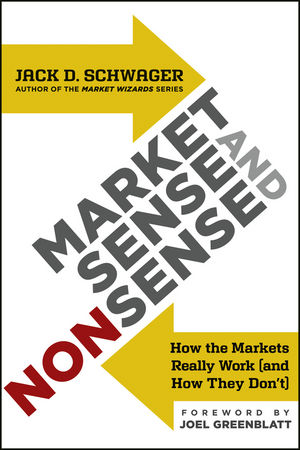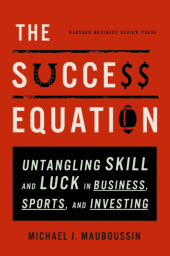This post originally appeared at the newish Amazon Money & Markets blog. Last month I had a post up there on “hedge fund managers as rock stars” that is worth a look as well. Both of the books mentioned below would make an excellent gift for the investor on your holiday list.

——-
Past performance is not necessarily indicative of future results.
That disclaimer, or some variation thereof, is a prominent part of any document related to the past performance of a money manager, mutual fund or managed account these days. This disclaimer is so common that is has become a cliché and no longer packs the impact that it probably should on prospective investors.
Investors rely heavily on past performance in part because it is the most salient piece of data we have on an investment. One could argue that Morningstar was built on satisfying our innate desire for information. Morningstar’s star ratings have been shown to have a meaningful impact on where investors put their hard-earned capital. With data we humans can’t help but to try and spin stories about causation and control. That is why we see so many stories in the media extolling the intelligence and decision-making skills of the best performing money managers.
What we should do is take past performance as a starting point for our analysis. Morningstar very early on recognized this and built out its capabilities as data analysts, not just data providers. The data we receive today on the performance of funds, ETFs and stocks is pretty straightforward. Analysts and journalists have easy access to all manner of return data and benchmarks. Despite that I note in my book, Abnormal Returns: Winning Strategies from the Frontlines of the Investment Blogosphere that we all too often seen the performance of disparate strategies compared to high profile benchmarks like the S&P 500. When in actuality the S&P 500 is really relevant to a subset of money managers.
Two recently published books from experienced market participants both get at this issue of how we should think about performance data. Jack Schwager, best known for his series of Market Wizards books, has a new book Market Sense and Nonsense: How Markets Work (and How They Don’t)* that boils down the lessons he has learned in analyzing money managers. Michael Mauboussin in The Success Equation: Untangling Skill and Luck in Business, Sports and Investing looks at the challenges of teasing out the competing effects of luck and skill on performance. While the books come from very different places they both have relevant insights into how we should properly put performance data into perspective.
Schwager’s book is spent debunking many common myths about the markets, many of which touch on this topic of performance data. In a number of observations Schwager notes how a manager’s track record is highly dependent on the risks they took to achieve it. These risks are not necessarily visible to the naked eye. It requires a deeper dive into the manager’s strategy. Not only is the manager’s risk profile relevant to analyzing past data, Schwager also notes that the market conditions at the time also have a big effect on manager performance. Schwager’s eighth “investment observation” rings true:
Past returns are not future returns. Past returns can be very misleading if there are reasons to believe that future market conditions are likely to be significantly different from those that shaped past returns. [p. 315]
 Investors need to be cognizant of the environment in which certain performance was achieved. Investors are all too familiar with a manager performing well in one market environment only to underperform in different market environment. In a sense many of Schwager’s lessons can be summed up as making sure you are comparing apples to apples when it comes to performance data.
Investors need to be cognizant of the environment in which certain performance was achieved. Investors are all too familiar with a manager performing well in one market environment only to underperform in different market environment. In a sense many of Schwager’s lessons can be summed up as making sure you are comparing apples to apples when it comes to performance data.
In a more philosophical sense investors also need to come to terms with the idea that the returns we see from managers are some combination of skill and luck. For many, especially in the financial media, that is a difficult lesson to incorporate. In acknowledging the role of luck it messes with our narratives. Mauboussin credibly argues that in the financial markets luck plays a large role in the differential performance we see among money managers. He writes:
Considering the evidence on balance, it is reasonable to conclude that there is evidence of skill in investing. However, only a small percentage of investors possess enough skill to offset fees. As a result, investing, especially over relative short periods of time, is more a matter of luck that skill. [p. 90]
 In regards to skill, Mauboussin makes another interesting point. He talks about the “paradox of skill” or the finding that the dispersion of investment returns, relative to a benchmark, has declined over time as more people and resources have entered the field of money management. It is simply now more difficult to find managers that substantially outperform (or underperform) the benchmark indices. Indeed one could argue that this result is an argument for a passive, indexed approach to investing.
In regards to skill, Mauboussin makes another interesting point. He talks about the “paradox of skill” or the finding that the dispersion of investment returns, relative to a benchmark, has declined over time as more people and resources have entered the field of money management. It is simply now more difficult to find managers that substantially outperform (or underperform) the benchmark indices. Indeed one could argue that this result is an argument for a passive, indexed approach to investing.
Much of the above discussion is really only relevant to investors who are interested in identifying managers or pursuing active strategies in hope of beating the market. Passive investors who invest in order to simply match the relevant indices for various asset classes need not concern themselves with much of this discussion.
However for anyone interested in performance data should have a strong sense for how those returns were generated. This involves not only understanding the data itself but also some sense for the risks taken and the sustainability of the strategy undertaken. This is no small feat. It requires an ability to comprehend investment strategies and how they performed in various market conditions. Above all it requires a dose of humility and recognition that luck plays an important role in the performance data we see and so often obsess about.
*Author received a review copy of this book from the publisher.








